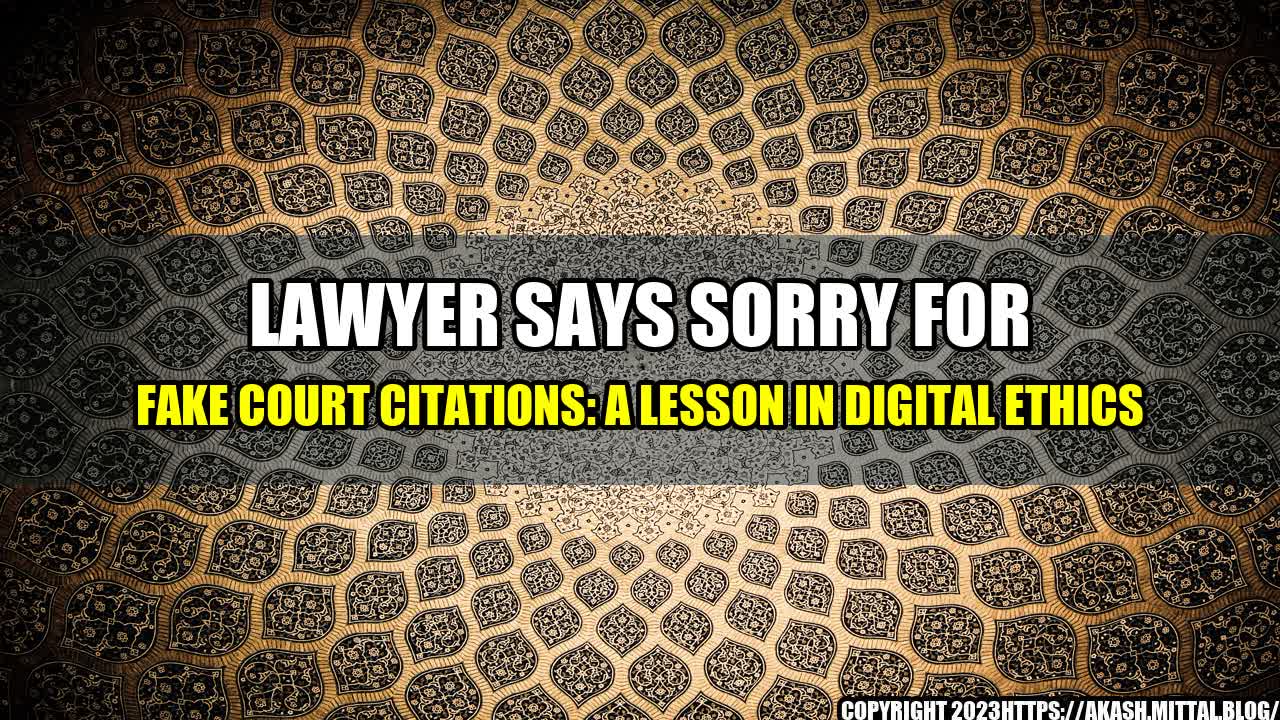Recently, a lawyer from Florida had to apologize for using fake court citations in his legal briefs. The story made the rounds in legal circles and raised important questions about digital ethics.
The lawyer, who remains unnamed, admitted that he had created at least a dozen fake citations to support his arguments. He claimed that he did not intend to deceive anyone and was only trying to make his case stronger.
While many may think that this is just a simple mistake, it is actually a serious violation of legal ethics. Lawyers have a responsibility to their clients, their profession, and the justice system to be honest and truthful. By using fake citations, this lawyer violated that trust and undermined the integrity of the legal system.
The Importance of Digital Ethics
The case of the Florida lawyer highlights the importance of digital ethics in today's world. With so much information available online, it is easy to get caught up in the ease of copying and pasting without verifying the source. However, as this story shows, taking shortcuts can have serious consequences.
Quantifiable Examples
This is not an isolated case. In fact, a survey by the Pew Research Center found that 51% of adults in the US have seen or heard false information in the news in the past two years. Additionally, a study by the University of Pennsylvania found that false news stories on Twitter spread faster and further than true stories.
The Impact of Fake News
The use of fake citations and the spread of false information can have far-reaching consequences. These can include:
- Undermining the public's trust in institutions, including the justice system
- Leading to incorrect decisions in legal or political matters
- Allowing individuals or groups to manipulate public opinion and influence elections
- Causing harm to individuals or groups who are targeted by the false information
The Importance of Verification
The case of the Florida lawyer also highlights the importance of verification. Whenever you use information in a legal brief, a news story, or any other type of document, it is essential to verify the sources. This means checking that the information is accurate, up-to-date, and reliable.
Verification requires time and effort, but it is an essential part of responsible information sharing. By taking the time to verify your sources, you can ensure that you are sharing accurate information that will not cause harm or damage to individuals or institutions.
An Opportunity to Learn
While the case of the Florida lawyer may seem like a cautionary tale, it also presents an opportunity to learn. By understanding the importance of digital ethics, we can all take steps to ensure that we are responsible sharers of information. These steps can include:
- Verifying sources before sharing or using information
- Being mindful of the impact that our words and actions can have on others
- Acting with integrity and honesty in all of our interactions online and offline
As someone who shares information online, I have encountered situations where I was not sure about the accuracy of a piece of information. In these cases, I have taken the time to research and verify the source before sharing it with others. While this takes time, I believe that it is essential to ensure that I am not contributing to the spread of false information.
Case Studies
One example of the impact of false information was the "Pizzagate" conspiracy theory. This theory alleged that a Washington, D.C. pizzeria was running a child sex ring with the involvement of high-ranking officials. The theory was completely false, but it gained traction online and led to a man entering the pizzeria with a gun in an attempt to "investigate" the claims.
Conclusion
The case of the Florida lawyer should serve as a wake-up call for all of us about the importance of digital ethics in today's world. We must all take responsibility for our words and actions online and ensure that we are being truthful, accurate, and responsible in all of our interactions. By doing so, we can help to ensure that the information we share is reliable and that we are not contributing to the spread of false information or the undermining of institutions.
Remember, verification is key, and taking the time to ensure that the sources we use are accurate is an essential part of being a responsible sharer of information.

Curated by Team Akash.Mittal.Blog
Share on Twitter Share on LinkedIn